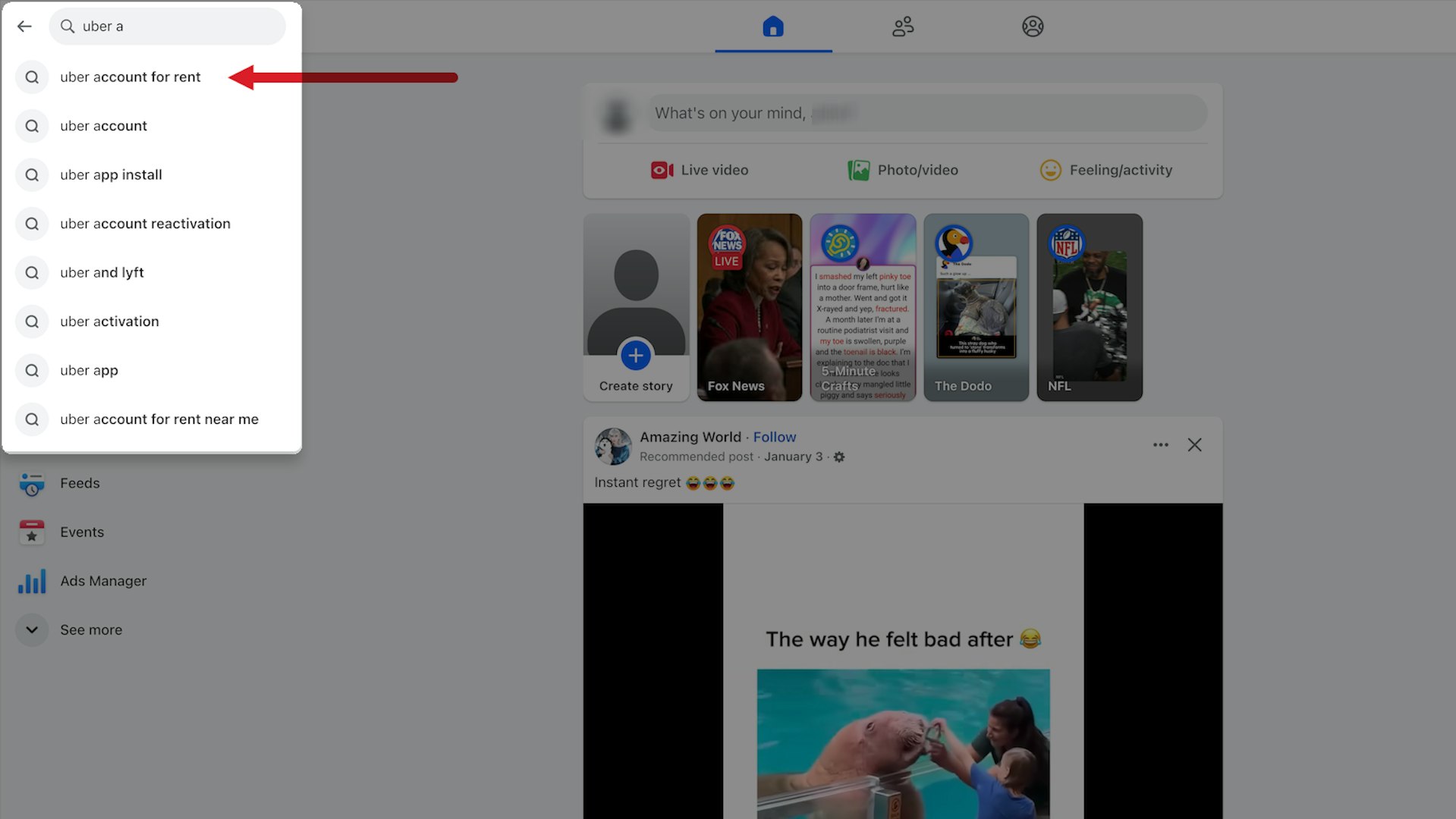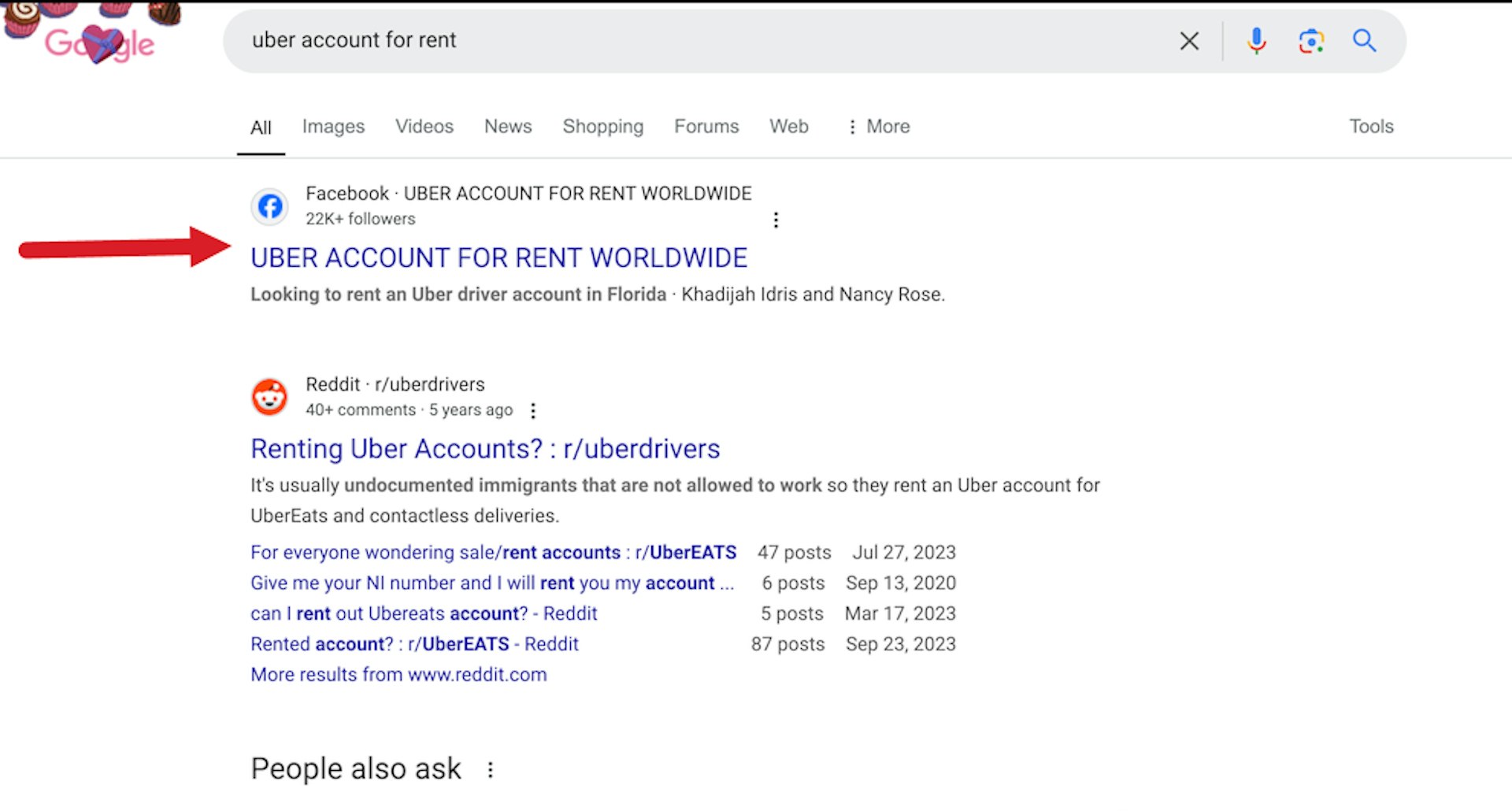Facebook is hosting dozens of black market groups where people can buy or rent Uber driver accounts, giving them a way to drive for these services under a false identity and putting passengers and customers at risk, a new Tech Transparency Project (TTP) investigation has found.
TTP identified 80 Facebook groups with a combined membership of more than 800,000 users that trade in driver accounts for Uber, DoorDash, and other rideshare and delivery apps. Many of the groups made no secret of their activity, with obvious names like “Uber Delivery Drivers Account For Rent."
This black market allows people to acquire driver accounts for Uber and other services without going through the required screening process or even having a valid driver’s license. The activity endangers passenger and customer safety and may violate U.S. law. A recent case involving a similar alleged scheme resulted in wire fraud and identity theft charges against more than a dozen people.
Facebook is allowing this market to thrive on its platform even though its parent company Meta has policies against fraud and the sale of “fake or forged documents.” Meta also bars Facebook groups from promoting “illegal activities, products, or services.” Uber, for its part, prohibits fraudulent activities including “creating fake, duplicate, or otherwise improper accounts” and “falsifying documentation.”
Facebook has faced years of criticism for failing to effectively enforce its content policies. When Meta CEO Mark Zuckerberg announced a Trump-friendly pivot away from fact checking and policing hate speech in January, the company made clear that its automated systems would continue to tackle clearly illegal activity such as fraud. But as TTP’s investigation shows, Meta is failing to meet its new, lowered bar for policy enforcement by hosting a thriving trade in fraudulent Uber driver accounts.
Facebook did not respond to a request for comment.
Asked about TTP's findings, Uber said it does not allow account sharing and has "robust safeguards" to verify that "the person using an account is the rightful owner." According to the company, social media platforms can help discourage this kind of illicit activity.
"Protecting the integrity of our platform is a top priority," Uber said in a statement. "When we determine that an account holder is engaging in account sharing, or other forms of fraud, we ban their account from the platform."
TTP conducted the bulk of its investigation from January to February 2025. As of April 1, nine of the 80 Facebook groups had been removed and one changed its focus, but the other 70 remained active and some had increased their membership.
Background and methodology
For the past decade, Uber has faced scrutiny for flouting laws and regulations during its rapid expansion in the U.S. and around the world. Much of that scrutiny has focused on allegations of laxness in the company’s screening process for drivers. Uber has faced years of lawsuits from women who say they were sexually assaulted by drivers. In 2019, London’s transport authority temporarily stripped Uber of its license to operate in the city, citing a “pattern of failures” that allowed unauthorized drivers to pick up passengers on at least 14,000 trips.
Against this backdrop, social media appears to be fueling the market for fake, stolen, or rented Uber driver accounts. TTP set out to examine the extent of the activity on Facebook, the world’s largest social network.
For this experiment, TTP set up a Facebook account for a hypothetical user and, logged in as the user, began typing the phrase “uber account” into the Facebook search bar. Before TTP had even finished typing the phrase, Facebook’s systems auto-completed a list of suggested search terms, starting with “uber account for rent.”
TTP clicked on “uber account for rent” and then the “groups” tab, to examine the Facebook groups that came up in this search result. Researchers counted 58 groups where users buy, sell, and rent Uber and other rideshare and delivery accounts like Lyft, DoorDash, and UK-based Deliveroo. Many of the Facebook groups had “account for rent” or “accounts for rent” in their name, making no secret of their business. TTP found an additional 22 Facebook groups while examining a network linked to one group administrator.
The investigation also looked at how Google handled the same search for “uber account for rent.” Using a new Google account for a hypothetical user and clean version of the Google Chrome browser with no prior browsing history, TTP plugged “uber account for rent” into Google’s search bar and examined the results.
The first Google result was a link to a Facebook group called “UBER ACCOUNT FOR RENT WORLDWIDE." The group, which had over 22,000 members, was filled with posts from people offering or seeking Uber driver accounts in different countries. The same group turned up in TTP’s earlier Facebook search.
This shows how Facebook’s lack of enforcement of its own rules can bleed into other platforms. TTP asked Google if this result violated its search policy against “pages with scammy or fraudulent content.” The company did not respond to a request for comment.
When a hypothetical Facebook user began typing the phrase “uber account” into the platform's search bar, Facebook auto-completed a list of suggested search terms starting with “uber account for rent.”
When a hypothetical Facebook user began typing the phrase “uber account” into the platform's search bar, Facebook auto-completed a list of suggested search terms starting with “uber account for rent.”
Thriving business
One Facebook group identified by TTP, “Uber Delivery Drivers Account for Rent,” gave its location as San Diego and Sacramento, California. The group was created June 30, 2024 and had 2,600 members. The “about” tab for the group gave a WhatsApp number for “Renting Or Buying Uber or Any Type Of Account.” (Meta also owns WhatsApp.)
The group’s feed was full of posts offering rideshare and delivery driver accounts for sale or rent. One post from Jan. 3, 2025 offered an Uber Eats driver account “on rent if anyone needs dm me.” It quickly received comments from people inquiring about the price and whether the account was authorized for a car or motorcycle. The poster responded, listing the price as $65.
On Jan. 14, 2025, another user in this group posted simply, “Uber Account, inbox me if you needed.” Despite the lack of details, the post received more than a dozen inquiries from people asking about the account. The poster told people to message him directly, a common tactic for online black market sellers who want to keep their transactions out of public view.
Many of the Facebook group names made no secret of their activity.
Many of the Facebook group names made no secret of their activity.
This group’s activity is transparently aimed at evading Uber’s screening process for drivers. Uber requires U.S. drivers have a valid driver’s license, at least one year’s driving experience, proof of residency, proof of vehicle insurance, and a driver profile photo. But if people can simply share driver accounts already approved by Uber, the company’s background checks are rendered worthless.
Facebook took no apparent action to restrict this trade, despite the fact that Meta prohibits “content that attempts to scam or defraud users and/or businesses.”
The offers in the group were not limited to Uber. TTP also observed users renting out driver accounts for food delivery apps DoorDash and Deliveroo.
A post from Jan. 12, 2025 read, “My platinum status DoorDash delivery account is available for rent, interested dasher should message me now for rent info.” Another user posted later that month, “I need delivero or just eat account for car for leedso,” an apparent reference to the city of Leeds in northern England. The post received 14 comments from members who said to message them on Telegram, Facebook Messenger, or other channels.
Like Uber, DoorDash prohibits accounts created with inaccurate or fraudulent information and says it deactivates them. Deliveroo likewise bans the buying, selling, or renting out of driver accounts.
DoorDash declined to comment.
A Deliveroo spokesperson said in a statement, “Buying or selling access to a rider account is against our terms of service, and we will offboard any account found to be partaking in this behaviour." The company added, "We take our responsibilities extremely seriously and will continue to strengthen our controls to prevent misuse of our platform.”
The Facebook groups trafficked in DoorDash as well as Uber driver accounts.
The Facebook groups trafficked in DoorDash as well as Uber driver accounts.
TTP did not interact with any of the users posting offers for driver accounts and was not able to examine the names, profile photos, or other details of the accounts for sale or rent. But clearly, they are meant to give people the ability to drive for these services under a false identity.
Some of the groups appeared to be part of a coordinated enterprise. For example, the administrator of the above group was listed as the admin for 25 other Facebook groups that hosted a trade in rideshare and delivery driver accounts. The groups, with names like “Door Dash Account Renting Usa” and “Uber Accounts USA,” had memberships ranging from four to 5,400 members. All showed they were created between April and December 2024, though the majority were created in a smaller window between June and July 2024.
At least 25 Facebook groups offering delivery and rideshare driver accounts listed the same administrator.
At least 25 Facebook groups offering delivery and rideshare driver accounts listed the same administrator.
Offers in Spanish
Seven of the Facebook groups identified by TTP were geared toward Spanish-speaking users.
One called “Cuenta Para Alquiler Y Compra(doordash o Uber)” or “Rent and Purchase Account (Doordash or Uber),” had 5,500 members and was created on June 20, 2024. The “about” tab for the group gave users a WhatsApp number to contact “to get custom third-party accounts or your own Doordash delivery accounts.” Within the group, members flooded the feed with requests and offers for delivery driver accounts.
A Feb. 1, 2025 post in the group offered an Uber Eats account with a “warranty” and “for any state,” and urged interested parties to reach out via WhatsApp. Another post from November 22, 2024 sought “data to set up accounts.” The post attracted multiple responses from users offering assistance.
In a Facebook group called “CUENTA PARA ALQUILER Y COMPRA (DOORDASH O UBER LYFT)” or “ACCOUNT FOR RENT AND PURCHASE (DOORDASH OR UBER LYFT),” some members offered driver accounts specifically for women drivers.
One post in the group from Jan. 16, 2025 offered driver accounts in Texas and Arizona, saying they were “created with real data and without history.” The reference to “real data” suggests the use of stolen information.
A number of the Facebook groups identified by TTP were aimed at Spanish speakers.
A number of the Facebook groups identified by TTP were aimed at Spanish speakers.
These Spanish-language groups may be aimed undocumented immigrants. As detailed in media reports in recent years, supplying migrants with rideshare and delivery driver accounts has become a lucrative business.
The Justice Department in May 2021 announced that 19 Brazilian nationals were charged with conspiracy to commit wire fraud for opening fraudulent driver accounts for multiple rideshare and delivery services using stolen identities, and renting or selling the accounts. Later, 14 of the defendants were hit with additional charges of aggravated identity theft in connection with the same case. (To date, 11 of the individuals involved in the case have been sentenced to prison.)
Global reach
A number of the Facebook groups identified by TTP promoted themselves as having national and even global reach.
For example, the Facebook group “UBER ACCOUNT FOR RENT WORLDWIDE”—which, as noted earlier in this report, came up in a Google search as well—had 22,100 members and was filled with posts seeking Uber accounts in different U.S. states and foreign countries. The group was created in November 2022 and listed five administrators.
Users in this group have sought Uber accounts across the U.S. “Hi I’m looking for renting a Uber delivery driver account in Los Angeles,” read one post on Feb. 9, 2024. Other posts that same day read, “Looking for an Uber eats account to rent in Virginia” and “Looking for an uber driver account for Saint Louis, MO.”
In keeping with the “worldwide” nature of this group, members have posted about looking to rent Uber accounts in Paris, London and Amsterdam; Glasgow, Scotland; Calgary and Vancouver, Canada; Sydney, Melbourne, Perth and Brisbane, Australia; and Cape Town and Durban, South Africa.
This Facebook group had more than 22,000 members and was filled with posts seeking Uber accounts in different U.S. states and foreign countries
This Facebook group had more than 22,000 members and was filled with posts seeking Uber accounts in different U.S. states and foreign countries
Users in some groups offer an extensive array of options.
In a group called “DOORDASH ACCOUNT FOR RENT AND SALE,” one member in March 2024 posted a menu of accounts for sale and rent. They included a DoorDash account for sale for $430 or for rent at a rate of $115 every 30 days; an Uber Eats account for sale for $385 or for rent at the same $115 rate; and an Uber Driver account for sale for $350 or rent for $115.
The post received 50-plus comments from users seeking information or wanting to do business. The user who posted the offer had a “rising contributor” badge, which Facebook gives to the “most active participants” in a group.
In another group called “Doordash account reactivation,” a user posted in August 2024 about a similar range of offerings: Uber and Uber Eats driver accounts for $85 a week and $185 a month, Lyft accounts for $55 a week, and Doordash and Deliveroo accounts for $85 a week. The post emphasized that “each account is registered in the name of a real person.”
This group, like others identified in this investigation, contained multiple offers to “reactivate” rideshare and delivery driver accounts, presumably to help people whose accounts have been deactivated for violations to get them back up and running.
Uber driver forums like UberPeople.net and the r/uberEATs subreddit are full of posts warning that “reactivation” offers are scams designed to deceive people out of their money or personal information. If so, that would be another violation of Meta’s policy against frauds, scams, and deceptive practices.
This post offering a menu of options for DoorDash, Uber, Lyft, and Amazon driver accounts received more than 50 comments. The user who posted it had a “rising contributor” badge, which Facebook gives to the “most active participants” in a group.
This post offering a menu of options for DoorDash, Uber, Lyft, and Amazon driver accounts received more than 50 comments. The user who posted it had a “rising contributor” badge, which Facebook gives to the “most active participants” in a group.
Private groups
Most of the Facebook groups identified by TTP were public groups, but three of them were private groups. TTP’s hypothetical Facebook user joined all three of these private groups, which required approval by a group admin.
One of the private groups examined by TTP, “Doordash & Uber Account for Rent And Sell Group,” had 13,400 members and gave its location as Los Angeles, Atlanta, and Utah. The group described itself as a place for “selling or renting or reactivating of account deliveroo account, doordash account etc.”
The group featured Facebook Messenger “community chats,” a group chat function that is directed by a group’s admin. In this case, the admin used the chat to direct users looking to rent or buy rideshare accounts to sellers via WhatsApp.
Perhaps suspicious of scams, some members sought to do business in person rather than online. Multiple users talked about renting DoorDash and Uber Eats accounts “face to face” while another seeking a DoorDash account said he “would prefer to meet in person first.”
TTP identified several private Facebook groups taking part in this illicit trade.
TTP identified several private Facebook groups taking part in this illicit trade.
In one case identified by TTP, a Facebook user offered delivery driver accounts with documentation, presumably to help with identity verification. In the group “deliveroo / just eat / drivers e-bike repairs group,” a member on April 14, 2024 offered “Doordash, Uber and Amazon account with legal documents available to rent and sell. Message me if interested.”
TTP found a similar issue in its 2022 report about the illicit sale of Facebook business manager accounts. Some of the sellers in that market offered packages of documents used for account verification, including government ID cards, passports, and U.S. Social Security cards.
This activity appears to violate Meta policies against “buying, selling or trading of Personal Identifiable Information” and potentially its ban on the “solicitation, creation, sale, purchase or trade of fake or forged documents.”
Conclusion
Meta’s recent announcement that it would scale back policy enforcement on its platforms made clear that its automated systems would continue to root out illegal activity—including fraud.
But TTP’s latest investigation found that Facebook is not meeting this lower bar for content moderation. It is allowing a thriving black market in driver accounts for Uber, DoorDash, and other rideshare and delivery services.
Anyone who acquires a driver account in this market would have the ability to ferry passengers or food deliveries under a false identity, bypassing the usual background checks. This creates obvious safety risks for Americans and others around the world who use these services.
Until Meta cleans up this problem, it will continue to facilitate fraudulent activity that shadows the entire rideshare industry.






































